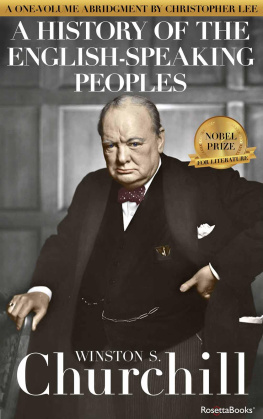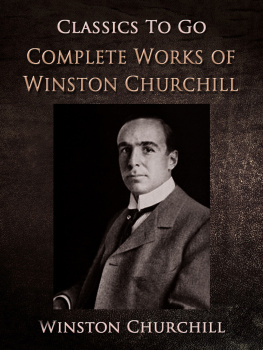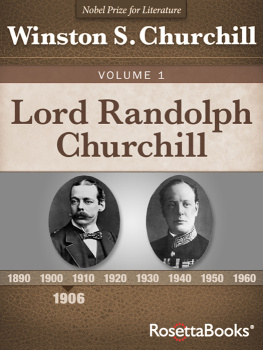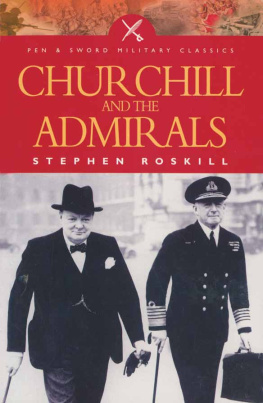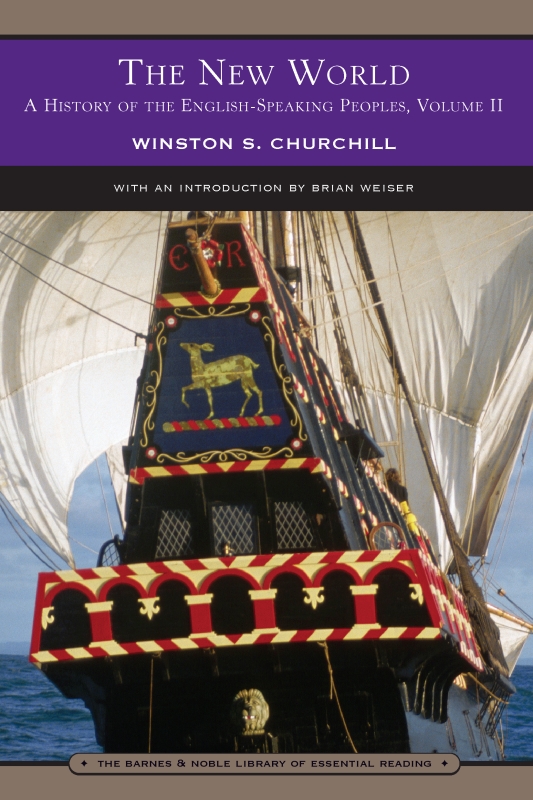
Table of Contents
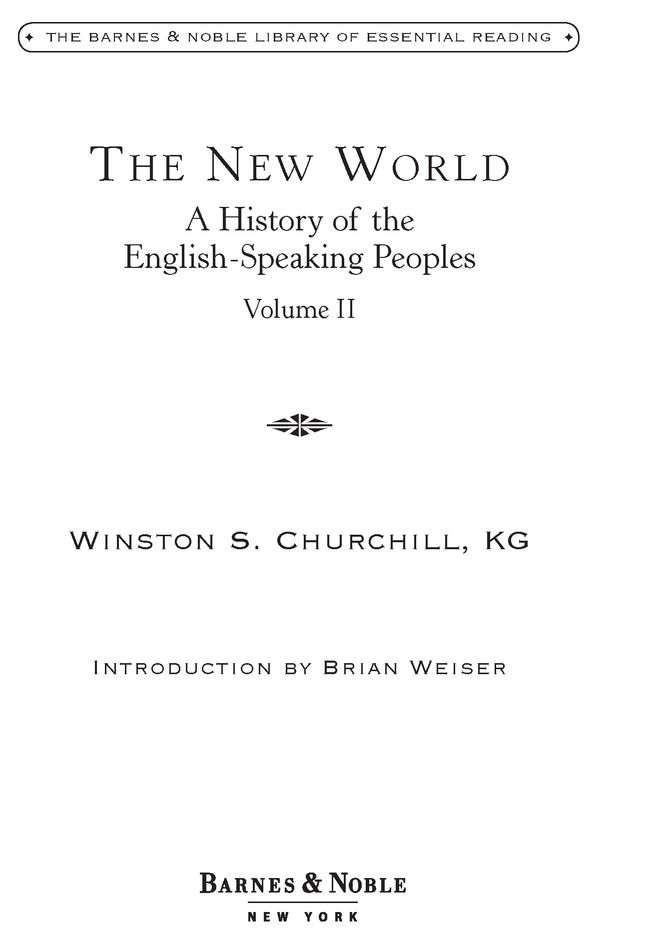
ACKNOWLEDGMENTS
I MUST AGAIN RECORD MY THANKS TO MR F. W. DEAKIN AND MR G. M. Young and to Dr Keith Feiling for their assistance before the Second World War in the preparation of this work; to Mr Alan Hodge, Mr J. Hurstfield of University College, London, Mr D. H. Pennington of Manchester University, and Dr A. L. Rowse of All Souls, who have scrutinised the text in the light of subsequent advances in historical knowledge; and to Mr Denis Kelly and Mr C. C. Wood. I have also to thank many others who have read these pages and commented on them.
In composing this volume I have drawn gratefully on the writings of Gardiner, Pollard and Ranke, on the Oxford History of England and on the works of other scholars past and present. In the last two chapters I have, with the permission of Charles Scribners Sons, Inc., followed in part the general character of my Marlborough: His Life and Times.
INTRODUCTION
IN THE SIXTEENTH AND SEVENTEENTH CENTURIES ENGLAND underwent a startling series of transformations. The turbulent reigns of the Tudors and Stuarts witnessed the Protestant Reformation, the growth of powerful monarchies, the English Civil War, and the colonization of the New World. In this, the second volume of his A History of the English-Speaking Peoples, Sir Winston Churchill turned his considerable rhetorical and analytical acumen to weaving a compelling and insightful narrative of these formative centuries.
It is amazing to consider that Winston Churchill, despite a busy political career, had the time and capability to write forty-five books. A number of forces brought him to such prolific heights. Churchill had a genuine curiosity about how things happened which reading and writing history helped satiate. Writing history also served as a way to influence political opinion. But financial necessity primarily caused Churchill to write so many books, for Churchills personal income could not support his lifestyle. While he was writing A History of The English-Speaking Peoples, in the late 1930s, his debt was so large that he took out an ad in the London Times to sell his beloved home of Chatham. He was bailed out by Sir Henry Strakosh. But he counted on the royalties of the four-volume work to pay back the loan.
Such a concern with output influenced Churchills method of composing books. Churchill never spent time in the archives, rather he would read general histories like those written by S. R. Gardiner and Leopold von Ranke and rely on a team of research assistants who supplied him with memoranda on topics he found interesting. Some of these assistants were great historians in their own right. Keith Feiling had already published his influential History of the Tory Party and Maurice Ashley would eventually write a host of books on the Stuart era. Luckily Ashley has left a record of what it was like to work for the great man. In his Churchill as Historian Ashley recalls that Churchill would pace up and down dictating from eleven at night until two in the morning, when he let his secretaries go home. Ashley would stay up working with Churchill for another hour, and Churchill himself would read until four in the morning. Although the assistants would provide Churchill with the facts, the interpretation was his own. He once told Ashley, Give me the facts... and I will twist them the way I want to suit my argument. Bill Deakin also recounted that when working for Churchill One felt exhilarated. Part of the secret was his phenomenal, fantastic power to concentrate on what he was doing. And he communicated it. You were absolutely a part of itswept into it. I might have given him some memorandum before dinner, four or five hours before. Now he would walk up and down dictating. My facts were there, but he had seen it in deeper perspective. My memorandum was only a frame; it ignited his imagination.
Churchills imagination and interpretation draw readers to his histories. His considerable political experience informs his work especially when he analyzes the decisions and personalities of the political actors of the sixteenth and seventeenth centuries. Reading Churchills books, however, reveals more than how one of the greatest British statesmen viewed the past, it also provides insight into Churchills own character, for A History of the English-Speaking Peoples shows how the authors biography influenced his biases, interpretations, and interests. The rest of this introduction will place The New World in the context of Churchills life experiences.
Churchill was born in 1874 in Blenheim Palace, the house built by the famous British general, John Churchill, Duke of Marlborough. His parents were Lord Randolph Churchill, who would rise to the heights of Chancellor of the Exchequer, and the American heiress Jennie Churchill (nee Jerome). In the circumstances of his birth lies much of his historical interest. For Churchill, history was a family affair: Two of his books, Lord Randolph Churchill and the four-volume Marlborough, directly celebrate his ancestors. Even in The New World where the Churchills played minor roles at best, Winston reserves some of his most flowery language for his illustrious ancestor when he describes the future Duke of Marlborough, who was a minor courtier during the reign of Charles II. Churchill effuses, in Charles Court, at his side, there was already a young man, an ensign in his Guards, a partner in his games at tennis, and intruder, as he learned with some displeasure, in the affections of Lady Castlemaine, who would one day grasp a longer and a brighter sword than Cromwells and wield it in wider fields, only against the enemies of British greatness and freedom. Churchills ancestral piety brings him to hyperbole.
But for most of the era covered by the book, the Churchills were obscure, and the community of English-speaking peoples, another idea born of his Anglo-American birth, captivates Winston. Since this volume ends in 1688 when the British colonies were quite small, Churchill rarely mentions major events in colonial history, except when his eponymous ancestor mentions the sunburnt America in his panegyric of Britain. Churchills admiration for America can find some release in his one chapter on the American colonies where he deems the Mayflower Compact one of the most remarkable documents in history.... Churchill mostly explores the theme of commonality among English speakers by finding the origins of common links that would unite them. For instance, he sees the American view of the courts being above the central authority as emerging from the ideas of Edward Coke, a lawyer who opposed some of the arbitrary measures of Charles I.
The King James Bible serves as the most important link that Churchill identifies. He considers the Bible James greatest achievement.... The scholars who produced this masterpiece are mostly unknown and unremembered. But they forged an enduring link, literary and religious, between the English speaking peoples of the world. Churchill also argued for the Bibles importance by claiming that if the adventurers to the new world brought any books over with them it was the Bible, Shakespeare, and later Pilgrims Progress. The fact that the King James Bible receives a great deal of attention, but neither Shakespeare nor John Bunyan merit even an entry in the index reveals much about Churchills biases. To Churchill, Shakespeare and Bunyan represented literary, cultural, or religious figures, but James I was a political actor, and Churchill was not interested in social or cultural history; his concerns were politics and war.
Next page

